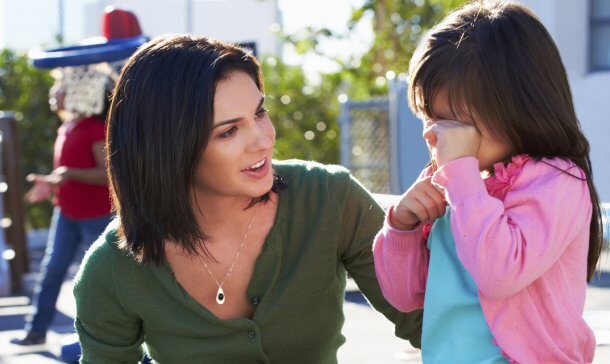What to Do When You're Doing Too Much for Your Kids

Do you ever feel you’re doing too much for your kids? If so, then you’ve definitely noticed how hard it is to stop.
Being an assertive mother can be challenging, so we’ve prepared some tools to make things easier.
When we do too much for our children, they tend to delegate their responsibilities to us. To better understand this, let’s look at a common example from everyday life:
Perhaps you’re always reminding your child that they haven’t done their homework, and warning them that they’ll get bad grades if they don’t keep up.
In the short term, this may seem helpful, but over the long haul it can become problematic. This is because your child won’t learn to take responsibility, nor practice important life skills like:
- Time management
- Self-discipline
See? By trying to help our children, we’re really sending them the wrong message. While we may have noble intentions, we shouldn’t let that get in the way of our children’s development, especially when it comes to accepting responsibility.
What does “doing too much” mean?
If you’re always putting on your child’s jacket and packing his or her backpack every night for the next day at school, you’re depriving them of the chance to experience what happens when you don’t take responsibility for yourself.
In other words, if they never have a bad experience, they won’t be able to learn or improve.
When a child experiences the natural consequences of his or her mistakes, a new learning opportunity emerges. It’s very important to allow them to fail so they’re able to grow.
If we let our children make a few mistakes in this vein, this will teach them to take precautions in the future. This ensures learning through lived experience.
If, however, you’re the one doing everything, you’ll be unwittingly depriving them of the opportunity to assume more responsibility so that they can perform better in life.

Doing too much for our kids means sheltering them from unpleasant experiences and tasks instead of teaching them to deal with these situations in the best possible way.
As a result, we foster a passive attitude towards life, meaning they’ll prefer to wait for things from others rather than taking initiative.
Trying new things
If your child has never tried new or different things, then they’ll never know how to start, or how to get back up and try again. Instead, they’ll think:
- That they can’t do it.
- That it’s not necessary to make an effort because others will do it for them.
As a mother, you’ll feel drained by the experience of not achieving a positive long-term result. In this sense, doing too much for your kids is doing the wrong thing.
Protecting your child from life’s hardships has a cost that may end up being too high. Kids need to learn to deal with life’s difficulties. They won’t if you’re always handling things for them.
While it may be tempting to go talk to a professor to get your child a higher grade, what real benefit is there?
How will they do better in the future if you don’t let them try for themselves?
A mutual opportunity for growth
It’s important to create opportunities for growth. Children’s mistakes will allow them to experience failure, frustration, disappointment, and discomfort.
These are vital and essential experiences because they provide the opportunity for kids to do their best. They will also get to practice new skills.

It’s natural for us to want to protect our kids from these bad experiences, but they don’t need this kind of overprotectiveness. What they need is guidance and support so they can face these circumstances again in the future.
Learning to manage life’s obstacles makes us all stronger. If you don’t allow your child the freedom to make mistakes, you’re stopping the learning process and running the risk of stunting his or her growth.
You’ll be preventing your children from developing the courage needed to try new things. However, if you let them learn, they’ll become brave enough to deal with less-than-ideal circumstances.
This is how they’ll discover their own potential and abilities.
Benefits of NOT doing too much for your kids
Problems will make your kids stronger and more capable of achieving goals. If you’re always taking control of their lives and not allowing them to find their own solutions, they won’t discover their strengths or learn resilience.
The ups and downs of life teach us to be tougher and help us realize that we’re more capable than we think. These experiences, and the lessons that come with them, are essential to becoming responsible and dynamic adults.
Parents must ensure that their children are safe and have sufficient skills to deal with life’s problems. This requires planning and anticipating situations. It also means being aware of how kids learn and the kind of support they need.
Mothers and fathers also need to have a certain amount of confidence in their children’s abilities in order to trust in their potential. They need to act as guides and provide the right kind of support.
This text is provided for informational purposes only and does not replace consultation with a professional. If in doubt, consult your specialist.








